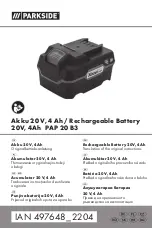
975-0526-01-02
35
Charging Batteries
Before you start to charge batteries read the “Important Safety Instructions”
on page iv and follow all safety precautions when working with batteries.
To charge your batteries:
1.
If possible, disconnect any heavy loads on the batteries being charged,
by opening disconnect switches or by switching the loads off.
2.
Connect the batteries to the charger by closing the DC disconnect
switches.
NOTE:
The onboard display LEDs will light up for a second.
3.
Ventilate the area around the battery thoroughly during charging.
Review the charging instructions supplied by the manufacturer of your
batteries and follow all safety precautions and the required steps.
4.
Apply AC power to the Truecharge2 Battery Charger by:
•
closing the AC breaker or
•
turning the generator on.
All onboard display indicator LEDs will illuminate for one second
(power on test) as the initialization sequence runs.
After initialization, the indicator LEDs will display present status and
settings. At this point, changes in Battery Type, Battery Temperature,
and/or Charger Mode can then be applied.
These settings are stored in memory (even when all power sources are
disconnected) and need not be entered after every initialization.
During charging, the Charging Output (%) LEDs will show the total
current being delivered to the battery bank as well as any DC load
applied. The charger fan may activate as well.
5.
After charging is completed, reconnect all loads to the battery.
The charger can be in one of eight different situations which will be
indicated on the onboard display in the Charger Status LEDs:
Mode
Charger Status LED—ON
Bulk
Charging
Absorption
Charging
Standby or Rest (two-stage charging)
Ready
Float (three-stage charging)
Ready and Charging
Equalize (in progress)
Equalize (solid light)
Equalize
(waiting for absorption to end)
Equalize (flashing)
Fault
Fault
a
(solid light)
a.In combination with one or more flashing Charging Output % LEDs.
Warning
Fault
a
(flashing)
TC2 204060 Series BattChg Owners Guide.book Page 35 Friday, July 8, 2011 11:44 AM
















































